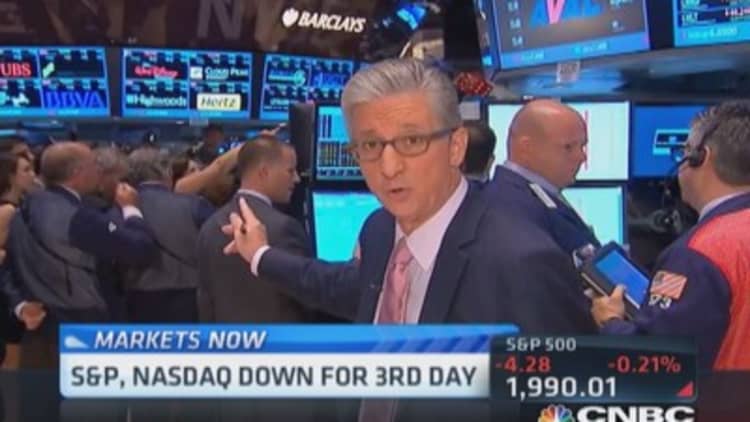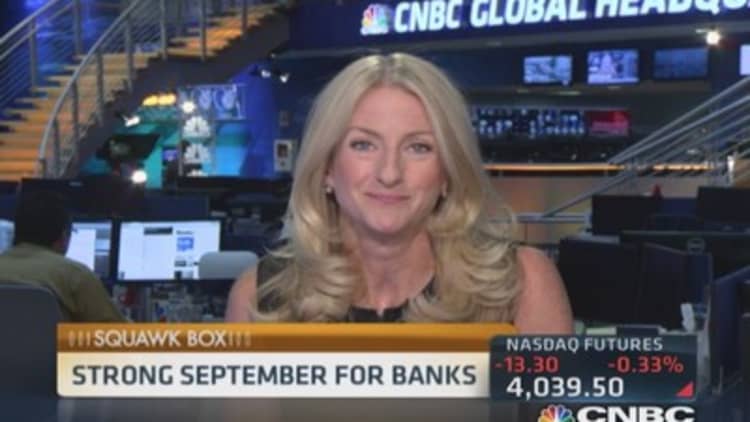
U.S. stocks declined on Tuesday, with the S&P 500 and Nasdaq falling for a third day to close at five-week lows, as investors weighed data illustrating a slowing global economy and tracked conflict in the Middle East.
"There has been a lot of negative thinking about China, Europe, and Ukraine, and lots of worries about the Middle East that could clearly get worse," said Hugh Johnson, chairman of Hugh Johnson Advisors.
"By my numbers we were 4 percent overvalued when we started this mess (pullback) and I would welcome a 6-to-8 percent decline," Johnson added.
The Russell 2000 Index of smaller companies also dropped for a third session, leaving it down 3.9 percent for the year.
"A lot of it is spillover from Europe, the data last night wasn't so great. We had the contraction in France, slower growth in Germany, and China came out with employment numbers that were not so great. People are nervous and taking profits after all-time highs," said JJ Kinahan, chief strategist at TD Ameritrade.
Shares of AbbVie declined after the Treasury Department moved to restrict tax-saving mergers, with the steps coming two months after the drug manufacturer said it would acquire Dublin-based Shire in a deal that involved AbbVie planning to transfer its headquarters overseas to reduce its taxes.
Apple rose as the company denied a TechCrunch report that it planned to close Beats Music, the streaming service the company recently purchased.
Read MoreMidday movers: AbbVie, Burger King, CarMax & more
"Everyone is worried; everyone is trying to call a market top," said Nick Raich, CEO of the Earnings Scout, who chalked up another day of selling on Wall Street to "profit taking ahead of earnings season" after gains last week.
The market's retreat "is a really welcome event; it starts to get stocks back to levels that make more sense," said Johnson.
The United States and Arab allies bombed Syria, killing dozens of Islamic State militants and members of a separate al Qaeda-tied group. And the Israeli army said it downed a Syrian fighter jet that violated its airspace.
Major U.S. Indexes
Marking its first back-to-back triple-digit losses in more than three months, the Dow Jones Industrial Average declined 116.81 points, or 0.7 percent, to 17,055.87, with UnitedHealth Group fronting blue-chip declines that extended to 29 of 30 components.
The dropped 11.52 points, or 0.6 percent, to 1,982.77, with consumer staples the leading laggard in a broad-based drop that included all 10 of its major sectors.
The S&P 500 is "still overbought on its daily chart, so initial support near 1,985-1,990 may be broken, putting next support near 1,950," Katie Stockton, chief technical strategist at BTIG, wrote in emailed research.
"The bulls would like to see it hold 1,990," said Kinahan of a scenario that did not pan out.
The CBOE Volatility Index, a measure of investor uncertainty, rose 9.1 percent to 14.93.
"The VIX has almost exploded over the last couple of weeks, it's up almost 21 percent over the last three weeks, so people are buying protection," noted Kinahan.
After a brief spin in positive terrain, the Nasdaq declined 19 points, or 0.4 percent, to 4,508.69.
For every stock rising, nearly three fell on the New York Stock Exchange, where nearly 719 million shares traded. Composite volume neared 3.3 billion.
"Today's volume is good, but not great, so this is not some definitive sell off where the world feels it has to be in," said Kinahan.
Data from overseas had euro-zone business growth falling to a 2014 low in September, while the HSBC/Markit Flash China Purchasing Managers' Index rose to 50.5 this month even as factory employment slid to its lowest in more than five years.
The yield on the 10-year Treasury note used to figure mortgage rates and other consumer loans fell 4 basis points to 2.529 percent, and the dollar declined against the currencies of major U.S. trading partners.
Dollar-denominated commodities rose on the New York Mercantile Exchange, with the cost of a barrel of crude rising 69 cents to $91.56 and gold up $4.10 at $1,222.00 an ounce.
On Monday, U.S. stocks fell, with small companies hardest hit, after China signaled it would not boost stimulus and after U.S. home sales unexpectedly fell in August.
Read MoreStocks drop along with small caps; Apple resumes rise

—By CNBC's Kate Gibson
Coming Up This Week:
Wednesday
10:00 a.m. New-home sales
12:15 p.m. Cleveland Fed President Loretta Mester
1:00 p.m. Chicago Fed President Charles Evans
Thursday
8:30 a.m. Weekly jobless claims
8:30 a.m. Durable goods
1:20 p.m. Atlanta Fed President Dennis Lockhart
Friday
8:30 a.m. GDP revision
9:55 a.m. Consumer sentiment
More From CNBC.com:


